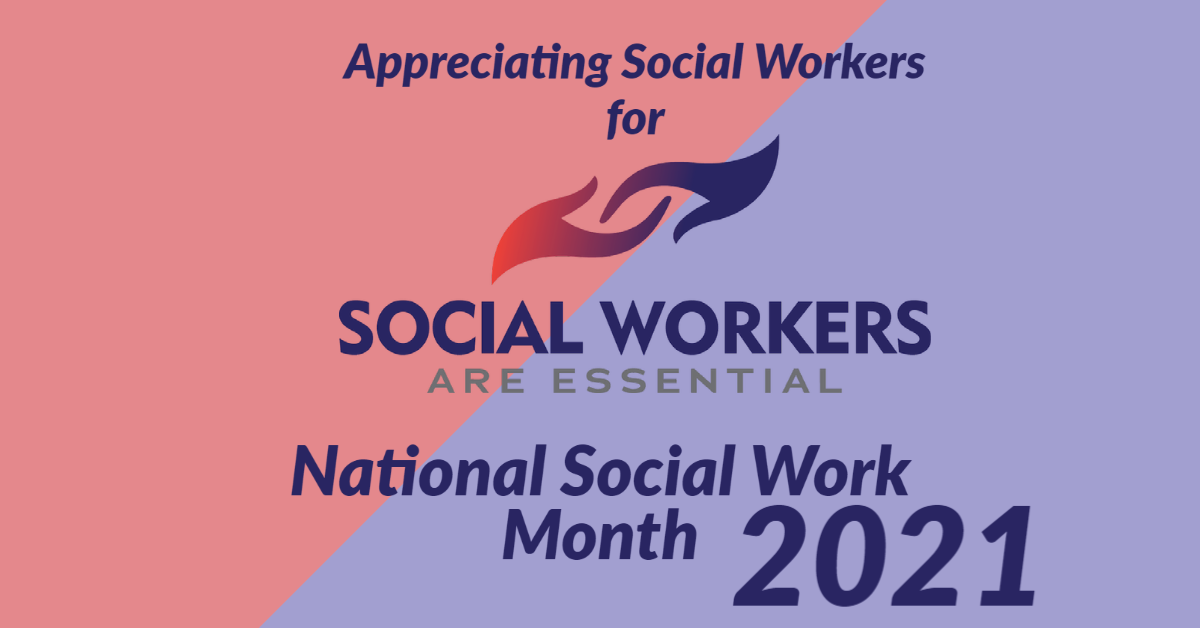March is National Social Work month!
I wanted to take this time to inform you on what Social Workers in the medical community actually do. My hope is that you will find a new appreciation for social workers. Social work is a difficult but rewarding career.

What does a Social Worker do?
What do you think of when you hear the profession “social work”?
Most people think of someone who works for the child welfare system and “takes away children from families”.
Unfortunately, social workers have gotten a bad rap. And I’m not sure how! We do so much and are involved in the community in so many ways.
Social Workers are in almost any field you can think of: Child Welfare, Schools, Nursing Homes, Hospice, Hospitals, Homeless programs, Food pantries, Substance abuse clinics, mental health clinics, the Military, grant writing, public health and clinical therapy. We do it all!
The many hats of a medical social worker
I’ll be sharing with you the role of a medical social worker since that is the particular field I am experienced with.
Medical social workers help run the hospital.
We make discharges from the hospital happen to allow more patients to get the care they need in a timely manner.
The Middle Man for Insurance Companies
Social workers know the ins and outs of Medicare, Medicaid and commercial health insurances. This includes knowing which plans provide certain services, what the patient’s copay might be, what prescription medications are covered, and overall what health services inside the hospital and in the community will be covered.
Social workers are in daily contact with insurance plans, this includes Medicare, Medicaid and Commercial plans. Countless hours are spent on the phone daily fighting with these insurance companies to help our patients get the necessary care they need.
Often it takes 10-30 minutes on hold just to talk to someone about our patient and their needs.
Social workers assist patients and families apply for Medicaid services so they can afford the care they need.
The Discharge Planner
We meet with medical teams daily. Time is spent discussing the needs of our patients and their barriers, trying to come up with creative solutions.
Social workers complete and fax the necessary paperwork with the appropriate “medical jargon” to get a procedure, medical device, medication or post hospital care covered.
In addition, we help get patients get to rehab after a hospital stay. We also set them up with home health services and medical equipment to ensure a safe and successful recovery at home if possible.
When independence in the home is no longer a safe option, we help families find retirement communities, assisted living facilities, memory care facilities, nursing homes and in home care for their loved ones.
We negotiate with facilities to allow a patient who doesn’t meet their cookie cutter checklist, an opportunity to get the care they need and deserve.
Social workers are continuously trying to evaluate and anticipate their patients needs through their entire hospital stay, and even afterwards!
The Resource Book
Social workers are constantly researching and building communication within the community to keep up to date on community resources we can refer our patients to.
Physicians, nurses, patients and families go to the social worker for information on any community resource you can think of. Additionally, social workers are expected to just “know” everything in the community that is available.
The Magicians
More than anything, social workers want to ensure patients and their families have everything they need to succeed in the community. Unfortunately, there are not always resources available for what is needed.
There are still rules and regulations we have to abide by. However, everyone believes we have the ability to make things happen despite the availability of resources.
Luckily, social workers can be very creative and resourceful. Sometimes we find ways around regulations or stumble upon loop holes to gain the necessary resources for patients. The ability to make patient needs a reality is an illusion of the hard work and hours that are put in to make it happen. Sometimes it’s even just coming out of our own personal pockets.
The Safety Net
Social workers catch diagnoses or medical needs that the doctors missed. Ensuring patients have everything they need to live the best qualify of life possible.
The Investigator
There are countless times that patients come into the hospital without identification or ability to tell medical staff who an emergency contact is. Social workers are expected to find this information for the hospital.
With limited resources and only google and social media at our finger tips, we rigorously search for a breadcrumb to lead us to the patient’s family.
The Comforter
Many times, social workers are the ones forced to give the bad news to patients and their families when the doctors don’t want to or don’t know how to.
We are comforters, providing unconditional support to our patients and families. At their side when the dying process begins and when it ends. We help patients understand and create advance directives and make preparations.
Social Workers help families make arrangements when they don’t know where to start or emotionally can’t handle it. In addition, we provide bereavement therapy and emotional support to families when their loved one is gone.
The Crisis Specialist
There are so many patients who struggle with addiction and mental illness. Social workers utilize motivational interviewing to help engage patients with addiction recovery.
When a patient is having suicidal thoughts, we are the ones to evaluate them, keep them calm, providing crisis intervention to keep them alive.
We work with the courts to get them into involuntary inpatient psych facilities for those are an extreme danger to themselves or others. We are encouraging them to voluntarily admit themselves first to get the help they need.
Social workers are called when a patient is having aggressive and psychotic behaviors, expected to calm them down to a stable level enough for staff to provide appropriate care. We try to engage their family members to be a part of their recovery processes.
The Secretary
Countless hours are spent completing all of the ridiculous medical paperwork for insurance companies to ensure our patients get the care they need. Moreover, we help fill out any FMLA paperwork for families and spend time trying to convince the physicians to complete their part in a timely manner.
To ensure our patients have continuity of care, we are on the phone scheduling outpatient doctor’s appointments. Social workers spend time on the phone trying to find a following primary care doctor for patients. This includes those that do have insurance and those that don’t.
The Advocate
Above everything else, social workers are advocates, fighting for patients to get the best quality of healthcare possible. We are fighting for our patients’ lives. Honestly, we do the work no one else wants to do.

Appreciate your social worker
It doesn’t matter what field a social worker is in, they wear many different hats throughout any given day. Sometimes these hats get heavy, but they do the work anyway. Their passion for helping others outweighs the long hours, poor pay, stress and sometimes poor treatment from patients, families or peers. Social Workers ARE Essential!
If you know a social worker, take this month to reach out to them and let them know how appreciated they are. Rarely, do social workers hear the words “thank you” and so it would help remind them why they do what they do.
If you are a social worker, I want you to know that I see everything you do. You have the soul of a fighter and although there are days that you want to give up, you don’t. You are doing the work that no one else wants to do but is desperately needed. Without you, this world would be a darker and dimmer place. Although you may not hear it often, you are amazing and I appreciate all that you do!


One response
Tabi, thanks for taking the time to share and write this. From one social worker to another, THANK YOU!